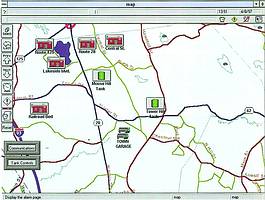

Prior to the installation of a PC-based control system using Citect scada software and radio modems for remote monitoring, North Reading (UK) Water Department staff were struggling to comply with
complex regulations.
Their difficulty was compounded by, firstly, the inability of the then-installed piecemeal control system to provide meaningful operational and maintenance data, and, secondly, that they were required to take daily readings out in the field - a somewhat tiresome task given the distances involved.
Since the installation of the Citect scada system, "They are flooded with information," says Department Superintendent Mark Clark. According to Clark, information provided by the new control system has provided benefits that were never envisioned when the project started. For example, by monitoring water usage and well levels during the regular filter backwash process, the department could see how the process caused the well level to drop abruptly at one stage.
As a result, they modified the process to reduce water demand at that stage and keep their wells at optimal levels.
Precise monitoring of flow means the department can now calculate on a minute-by-minute basis the water demands of the consumers. Rapid information access enables them to see how usage patterns affect water levels in the district's two storage tanks. This data is going to be invaluable for a study when we propose to build a new, third tank.
According to Clark, North Reading's existing tanks were put in place before houses had been placed on many of the town's hilltops. New building has created a demand for better water pressure. Because North Reading draws water from six wells in a tightly regulated river basin, it must purchase additional water from an adjacent town when it draws more water from the highly stressed river watershed than allowed by regulations. Tighter monitoring of flow rates and tank levels by the combination of the Citect scada system and inexpensive radio data modems, make it possible to monitor the status of the entire system instantaneously and to avoid the purchase of expensive water - resulting in a saving of some 25% on their annual operating expenses!
Another saving that the district expects from automation is the ability to operate without having staff on duty 24 hours a day. At present two water treatment plant operators can use a dial up modem and laptop PC to check the status of any equipment anywhere in the system, changing setpoints, pump status and other parameters without having to be on site. In addition, the improved data collection from the Citect scada system ensures that documentation required to meet increasingly stringent regulations, is provided automatically despite the system being unmanned outside day shift.
Functions performed by the Citect scada system in the main plant include remote monitoring of well levels and control of related pumps; monitoring flows, tank levels and pressures in two storage tanks and in pipes throughout the town; chlorination, fluoridation and addition of potassium hydroxide for control of pH and corrosion; automatic backwashing of the system's three main water filters.
The radio modems used have a four-year payback time compared to the cost for leased lines. Use of RF makes it easier for the user to correct communications problems not being dependent on the phone company for responses. The combination of radio networking and leased lines on the same system allows the North Reading water department to realise the benefits of wireless communication and access from remote sites.
"We found that the built-in networking capabilities, speed, and the powerful graphics features of the package allowed us to have a finished system that was more powerful, easier to use and exceeded our expectations," concluded Clark.
Xycom South Africa
(011) 462 6671
© Technews Publishing (Pty) Ltd | All Rights Reserved